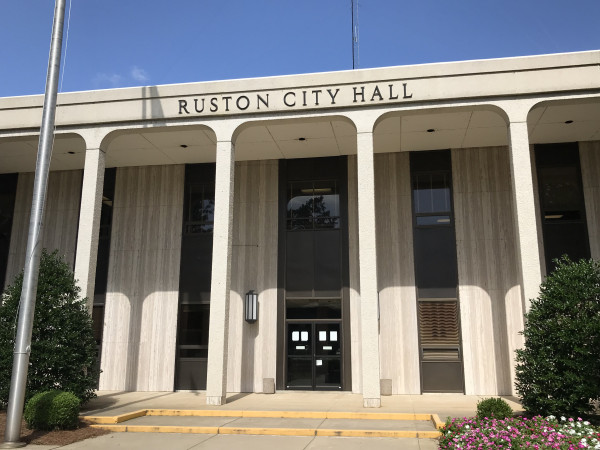Group seeks ‘Real Change in Ruston’

Only hours before more than 1,000 people peacefully marched from Louisiana Tech’s campus to Ruston’s City Hall in memory of a black Minnesota man who died in police custody, Mayor Ronny Walker pledged to form a committee “driven by citizens who really want to see change” to address remnants of racism in the city.
Walker’s pledge came on a day filled with local reactions to the death of George Floyd, who died May 25 after a police officer held his knee on Floyd’s neck for almost nine minutes.
The idea of convening a group was in the works before the Floyd incident and the subsequent local march on June 4. But the killing and subsequent national unrest added to the urgency.
Walker was determined that whatever Ruston did in response, it would not be just another report to set on a shelf and gather dust.
“Everybody wants to talk about doing something, but does anything ever really come of it? And the answer is ‘no,’” Walker said last week in talking about a new city partnership called Real Change in Ruston.
Real Change in Ruston is a joint venture between the city of Ruston, Zion Traveler Community Development Corporation, along with the local businesses and other organizations that will give eligible residents who’ve never owned a home a chance to do so. Plans call for 19 singlefamily houses to be built on the old fairgrounds site on Martin Luther King Drive.
After five years of successful renting, plus the completion of a series of classes, including financial planning, renters can buy their home.
“The ultimate goal is to get minorities and the least of these on the path toward home ownership,” Pastor Maurice White, of Zion Traveler Baptist Church, one of the project partners, said.
Organizers say the project is a wholistic approach to reducing poverty. They also say God’s hand has been in the effort since its inception.
“God has an appointed time for all of us, and has appointed this time … to bring folks together and empower our community,” Grambling State University President Rick Gallot said Tuesday during a meeting in which Real Change in Ruston was rolled out to area clergy and community help organizations.
GSU is also a Real Change in Ruston partner.
“It’s real change for Ruston and it’s real change for Lincoln Parish,” Gallot said.
The beginning
Two weeks after the June 4 march, a group of six people — three city government representatives and three local clergymen — began meeting weekly to delve into what Ruston could do to look at racial reconciliation.
They axed some ideas off the list, deciding that either the city wasn’t the proper entity to tackle them, or some other agency was already charged with addressing those issues.
From the start, it was a given that poverty is an issue in Ruston, especially among the African American community. According to the Census Bureau, slightly more than 50% of the city’s Black residents live in poverty.
That compares to 29% of white residents. Overall, the city’s poverty is almost 41% — and growing at an annual rate of .06%.
Poverty in Ruston is almost four times the national average and slightly more than double Louisiana’s poverty rate.
The committee settled on housing as something the city could tackle.
“This is part of Ruston’s answer to this year’s national narrative,” City Planner John Waltz said.
For three years, Ruston has been chasing a $3 million federal Housing and Urban Development grant to turn the 12-acre former fairgrounds into a neighborhood.
To Walker, the city-owned acreage is perfect. It’s near a public park and at least one church — Zion Traveler.
Meantime, unbeknownst to Walker, Zion Traveler was forming a community development corporation to tackle poverty. Likewise, Zion Traveler didn’t know the city was chasing a HUD grant.
What happened next is clear to Walker.
“God started moving,” he said.
About a week after the mayor learned Zion Traveler was working on a CDC, the city got word from HUD that “we’re ready to roll.”
Then, the committee learned about other community partners able to help with the education component and a third-party provider to manage the homes.
“It’s all coming together. God’s hand has been in this in such a powerful way. God puts people in places to make things happen,” Walker said. “We have an opportunity in this city to do something that no other city our size has done.”
How the program works
Construction on the homes could begin within the next six months. All of the houses will face Cornell Street. The homes will be two- to three-bedrooms, twobath units, built in a Craftsman or similar architectural style. Each home will be approximately 1,100 square feet.
Plans call for using as many minority contractors as possible on the project.
Once tenant families are selected — the criteria has not been finalized — the tenants can rent their house for five years. Then HUD will deed the homes to the city through its housing authority.
Also, after the initial five years, tenants have an option to buy their home. During that first five years, tenants will be required to attend classes on finances, home ownership and other topics.
The classes will be taught through the Zion Traveler CDC. Tenants will earn points for each completed class.
“The more points they earn, the less we sell the house for,” Walker said. “The more you do, the less you have to pay in the end.”
Money from the sale of the houses goes back to the city to build more homes. The fairgrounds property can accommodate about 50 similarsized homes.
“All of a sudden we break the cycle of poverty,” Walker said. “This could change people’s lives for generations to come in the city of Ruston.”

